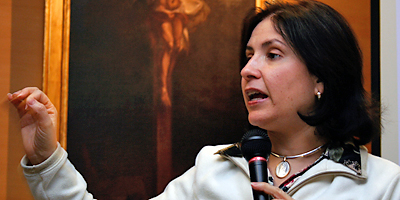
 COLUMBIA—Everyone deserves to hear the Gospel message, no matter where they are from or what language they speak. Remembering that simple truth can help all Catholics welcome people of different cultures into their community, according to Martha Fernandez-Sardina, director of evangelization for the Archdiocese of San Antonio.
COLUMBIA—Everyone deserves to hear the Gospel message, no matter where they are from or what language they speak. Remembering that simple truth can help all Catholics welcome people of different cultures into their community, according to Martha Fernandez-Sardina, director of evangelization for the Archdiocese of San Antonio.
She spoke to more than 170 connected with religious education and parish ministries who attended “Evangelization in a Multicultural Setting,” held at St. Peter Church in Columbia Feb. 5.
“Evangelization is basically a work of love,” Fernandez-Sardina said. “Love enables us to see another and say ‘That is my sister, that is my brother.’ We must be willing to talk about love and show love because otherwise we start looking at one another as ‘we’ and ‘they.’”
The situation for immigrant Catholics in the United States has changed in recent decades. For much of the 20th century, immigrants often had their own parishes, with clergy who spoke their language and knew their culture.
Things are completely different today. People from other nations join parishes where they are in the minority and the established members wonder how to reach out to those who may speak another language or have a different worship style or tradition.
Fernandez-Sardina said it’s a good idea to address specific spiritual needs of newcomers while trying to involve them in mainstream parish life.
A good goal, she said, is to achieve what the U.S. Conference for Catholic Bishops refers to as “ecclesial integration,” which means full involvement in the church and commitment to its mission without forcing people to completely lose ties to their own languages and cultures.
Hispanics are the largest group of immigrants coming into U.S. Catholic churches today. Many South Carolina parishes also have growing Vietnamese, Korean and other Asian communities.
She said it’s important to make people feel welcome or they may go to another church or stop attending Mass.
Recent surveys show that many Hispanics leave the Catholic Church for Pentecostal, Protestant and evangelical churches that target ministries to their community.
Outreach can be as simple as finding someone who speaks Spanish and could lead a Bible study.
“While immigrants are learning English, it doesn’t absolve the church from evangelizing to people in their own language,” she said. “The goal of multicultural ministry is striving for the oneness we have in Christ, recognizing our sameness in the Catholic faith. We should believe that it’s important that men and women come to Christ and are one in Christ.”
Often, good evangelizers come from within immigrant communities, she said. Men and women who were leaders at church in their home countries are more likely to be involved with the parish in general, develop a sense of stewardship and share the Gospel with others if given a leadership role.
Fernandez-Sardina said evangelization can’t take place at any level if people allow cultural or political differences to separate them.
“All of us, regardless of the language we speak or ethnic background, have to be thoroughly converted and dedicated to follow the mandate to love one another,” she said. “We’re not going to get the job done without that conversion.”
